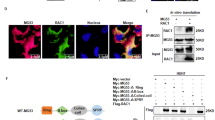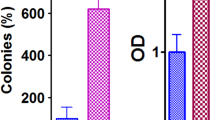Abstract
Aberrant CCN1 expression has been reported to play an important role in the tumor development. However, the pattern and the role of CCN1 in pancreatic cancer remain largely unknown. Therefore, we further deciphered the role CCN1 played in pancreatic cancer. We first evaluated the CCN1 expression in human pancreatic cancer tissues and pancreatic cancer cells. Then we forced expression and silenced CCN1 expression in pancreatic cancer cell lines MIA PaCa2 and PANC-1 respectively, using lentivirus vectors. We characterized the stable cells in vitro and in vivo using a nude mouse xenograft model. In this study, we found that CCN1 expression was significantly higher in cancer specimens which positively correlated with the expression level of phosphorylated Akt and p65. and poorer outcome. Moreover, our results demonstrated that CCN1 positively regulated pancreatic cell growth in vitro and in vivo and helped cancer cells resist to tumor necrosis factor alpha-induced apoptosis. Furthermore, we disclosed that activation of CCN1/ras-related c3 botulinum toxin substrate 1 (Rac1)/V-akt murine thymoma viral oncogene homolog (Akt)/nuclear factor-kappa B pathway inhibited apoptosis in pancreatic cancer cells. CCN1 is upregulated in pancreatic cancer and promotes the survival of pancreatic cancer cells. Taken together, these results indicate that CCN1 may be a potential target for pancreatic cancer therapy.






Similar content being viewed by others
References
Jemal A, Siegel R, Ward E, Hao Y, Xu J, Thun MJ. Cancer statistics. CA Cancer J Clin. 2009;59:225–49.
Jemal A, Siegel R, Ward E, Hao Y, Xu J, Murray T, et al. Cancer statistics. CA Cancer J Clin. 2008;58:71–96.
Sohn TA, Yeo CJ, Cameron JL, Koniaris L, Kaushal S, Abrams RA, et al. Resected adenocarcinoma of the pancreas-616 patients: results, outcomes, and prognostic indicators. J Gastrointest Surg. 2000;4:567–79.
Yang GP, Lau LF. Cyr61, product of a growth factor-inducible immediate early gene, is associated with the extracellular matrix and the cell surface. Cell Growth Differ. 1991;2:351–7.
Perbal B. Nov (nephroblastoma overexpressed) and the ccn family of genes: structural and functional issues. Mol Pathol. 2001;54:57–79.
Bork P. The modular architecture of a new family of growth regulators related to connective tissue growth factor. FEBS Lett. 1993;327:125–30.
Grzeszkiewicz TM, Lindner V, Chen N, Lam SC, Lau LF. The angiogenic factor cysteine-rich 61 (cyr61, ccn1) supports vascular smooth muscle cell adhesion and stimulates chemotaxis through integrin alpha(6)beta(1) and cell surface heparan sulfate proteoglycans. Endocrinology. 2002;143:1441–50.
Lin MT, Chang CC, Chen ST, Chang HL, Su JL, Chau YP, et al. Cyr61 expression confers resistance to apoptosis in breast cancer mcf-7 cells by a mechanism of nf-kappab-dependent xiap up-regulation. J Biol Chem. 2004;279:24015–23.
Tsai MS, Bogart DF, Castaneda JM, Li P, Lupu R. Cyr61 promotes breast tumorigenesis and cancer progression. Oncogene. 2002;21:8178–85.
Xie D, Yin D, Tong X, O'Kelly J, Mori A, Miller C, et al. Cyr61 is overexpressed in gliomas and involved in integrin-linked kinase-mediated akt and beta-catenin-tcf/lef signaling pathways. Cancer Res. 2004;64:1987–96.
Holloway SE, Beck AW, Girard L, Jaber MR, Barnett Jr CC, Brekken RA, et al. Increased expression of cyr61 (ccn1) identified in peritoneal metastases from human pancreatic cancer. J Am Coll Surg. 2005;200:371–7.
Kwon HC, Roh MS, Oh SY, Kim SH, Kim MC, Kim JS, et al. Prognostic value of expression of ercc1, thymidylate synthase, and glutathione s-transferase p1 for 5-fluorouracil/oxaliplatin chemotherapy in advanced gastric cancer. Ann Oncol. 2007;18:504–9.
Tong X, O'Kelly J, Xie D, Mori A, Lemp N, McKenna R, et al. Cyr61 suppresses the growth of non-small-cell lung cancer cells via the beta-catenin-c-myc-p53 pathway. Oncogene. 2004;23:4847–55.
Chien W, Kumagai T, Miller CW, Desmond JC, Frank JM, Said JW, et al. Cyr61 suppresses growth of human endometrial cancer cells. J Biol Chem. 2004;279:53087–96.
Feng P, Wang B, Ren EC. Cyr61/ccn1 is a tumor suppressor in human hepatocellular carcinoma and involved in DNA damage response. Int J Biochem Cell Biol. 2008;40:98–109.
Haque I, Mehta S, Majumder M, Dhar K, De A, McGregor D, et al. Cyr61/ccn1 signaling is critical for epithelial-mesenchymal transition and stemness and promotes pancreatic carcinogenesis. Mol Cancer. 2011;10:8.
Sun ZJ, Wang Y, Cai Z, Chen PP, Tong XJ, Xie D. Involvement of cyr61 in growth, migration, and metastasis of prostate cancer cells. Br J Cancer. 2008;99:1656–67.
Deng YZ, Chen PP, Wang Y, Yin D, Koeffler HP, Li B, et al. Connective tissue growth factor is overexpressed in esophageal squamous cell carcinoma and promotes tumorigenicity through beta-catenin-T-cell factor/Lef signaling. J Biol Chem. 2007;282:36571–81.
Juric V, Chen CC, Lau LF. Fas-mediated apoptosis is regulated by the extracellular matrix protein ccn1 (cyr61) in vitro and in vivo. Mol Cell Biol. 2009;29:3266–79.
Franzen CA, Chen CC, Todorovic V, Juric V, Monzon RI, Lau LF. Matrix protein ccn1 is critical for prostate carcinoma cell proliferation and trail-induced apoptosis. Mol Cancer Res. 2009;7:1045–55.
Farrow B, Evers BM. Inflammation and the development of pancreatic cancer. Surg Oncol. 2002;10:153–69.
McDade TP, Perugini RA, Vittimberga Jr FJ, Carrigan RC, Callery MP. Salicylates inhibit NF-kappaB activation and enhance TNF-alpha-induced apoptosis in human pancreatic cancer cells. J Surg Res. 1999;83:56–61.
Lin MT, Kuo IH, Chang CC, Chu CY, Chen HY, Lin BR, et al. Involvement of hypoxia-inducing factor-1alpha-dependent plasminogen activator inhibitor-1 up-regulation in cyr61/ccn1-induced gastric cancer cell invasion. J Biol Chem. 2008;283:15807–15.
Yoshida Y, Togi K, Matsumae H, Nakashima Y, Kojima Y, Yamamoto H, et al. Ccn1 protects cardiac myocytes from oxidative stress via beta1 integrin-akt pathway. Biochem Biophys Res Commun. 2007;355:611–8.
Gery S, Xie D, Yin D, Gabra H, Miller C, Wang H, et al. Ovarian carcinomas: CCN genes are aberrantly expressed and CCN1 promotes proliferation of these cells. Clin Cancer Res. 2005;11:7243–54.
Laezza C, Malfitano AM, Di Matola T, Ricchi P, Bifulco M. Involvement of Akt/NF-kappaB pathway in N(6)-isopentenyladenosine-induced apoptosis in human breast cancer cells. Mol Carcinog. 2010;49(10):892–901.
Wang Z, Li Y, Banerjee S, Kong D, Ahmad A, Nogueira V, et al. Down-regulation of Notch-1 and Jagged-1 inhibits prostate cancer cell growth, migration and invasion, and induces apoptosis via inactivation of Akt, mTOR, and NF-kappaB signaling pathways. J Cell Biochem. 2010;109:726–36.
Ho HH, Chang CS, Ho WC, Liao SY, Wu CH, Wang CJ. Anti-metastasis effects of gallic acid on gastric cancer cells involves inhibition of NF-kappaB activity and downregulation of PI3K/AKT/small GTPase signals. Food Chem Toxicol. 2010;48:2508–16.
Lin MT, Zuon CY, Chang CC, Chen ST, Chen CP, Lin BR, et al. Cyr61 induces gastric cancer cell motility/invasion via activation of the integrin/nuclear factor-kappaB/cyclooxygenase-2 signaling pathway. Clin Cancer Res. 2005;11:5809–20.
Wang B, Ren J, Ooi LL, Chong SS, Lee CG. Dinucleotide repeats negatively modulate the promoter activity of Cyr61 and is unstable in hepatocellular carcinoma patients. Oncogene. 2005;24:3999–4008.
Tong X, Xie D, O'Kelly J, Miller CW, Muller-Tidow C, Koeffler HP. Cyr61, a member of CCN family, is a tumor suppressor in non-small cell lung cancer. J Biol Chem. 2001;276:47709–14.
Ren K, Zhang W, Shi Y, Gong J. Pim-2 activates API-5 to inhibit the apoptosis of hepatocellular carcinoma cells through NF-kappaB pathway. Pathol Oncol Res. 2010;16:229–37.
Kang DW, Min G, do Park Y, Hong KW, do Min S. Rebamipide-induced downregulation of phospholipase D inhibits inflammation and proliferation in gastric cancer cells. Exp Mol Med. 2010;42:555–64.
Kinoshita J, Fushida S, Harada S, Makino I, Nakamura K, Oyama K, et al. PSK enhances the efficacy of docetaxel in human gastric cancer cells through inhibition of nuclear factor-kappaB activation and survivin expression. Int J Oncol. 2010;36:593–600.
Tian F, Zang WD, Hou WH, Liu HT, Xue LX. Nuclear factor-kB signaling pathway constitutively activated in esophageal squamous cell carcinoma cell lines and inhibition of growth of cells by small interfering RNA. Acta Biochim Biophys Sin (Shanghai). 2006;38:318–26.
Shah SA, Potter MW, Hedeshian MH, Kim RD, Chari RS, Callery MP. PI-3' kinase and NF-kappaB cross-signaling in human pancreatic cancer cells. J Gastrointest Surg. 2001;5:603–12. discussion 612-603.
Fahy BN, Schlieman MG, Virudachalam S, Bold RJ. Inhibition of AKT abrogates chemotherapy-induced NF-kappaB survival mechanisms: implications for therapy in pancreatic cancer. J Am Coll Surg. 2004;198:591–9.
Liu C, Zhou S, Ke CS, Li NP, Wu RL. Activation and prognostic significance of AKT, NF-kappaB and STAT3 in breast cancer with lymph node metastasis and estrogen receptor expression. Ai Zheng. 2007;26:929–36.
Bialkowska K, Zaffran Y, Meyer SC, Fox JE. 14-3-3 zeta mediates integrin-induced activation of Cdc42 and Rac. Platelet glycoprotein Ib-IX regulates integrin-induced signaling by sequestering 14-3-3 zeta. J Biol Chem. 2003;278:33342–50.
Cruz-Monserrate Z, O'Connor KL. Integrin alpha 6 beta 4 promotes migration, invasion through Tiam1 upregulation, and subsequent Rac activation. Neoplasia. 2008;10:408–17.
Chaturvedi P, Singh AP, Moniaux N, Senapati S, Chakraborty S, Meza JL, et al. Muc4 mucin potentiates pancreatic tumor cell proliferation, survival, and invasive properties and interferes with its interaction to extracellular matrix proteins. Mol Cancer Res. 2007;5:309–20.
Wang LH. Molecular signaling regulating anchorage-independent growth of cancer cells. Mt Sinai J Med. 2004;71:361–7.
Acknowledgments
This work was sponsored by the National Natural Science Foundation of China, grant number 81070287 and Zhenjiang Science and Technology Pillar Program, grant numbers SH2009013 and SH2011026.
Conflicts of interest
None
Author information
Authors and Affiliations
Corresponding author
Additional information
Authors Xuqing Wang, Yuezhen Deng, Zhengfa Mao, and Xiaoyan Ma equally contributed to this work
Rights and permissions
About this article
Cite this article
Wang, X., Deng, Y., Mao, Z. et al. CCN1 promotes tumorigenicity through Rac1/Akt/NF-κB signaling pathway in pancreatic cancer. Tumor Biol. 33, 1745–1758 (2012). https://doi.org/10.1007/s13277-012-0434-z
Received:
Accepted:
Published:
Issue Date:
DOI: https://doi.org/10.1007/s13277-012-0434-z




